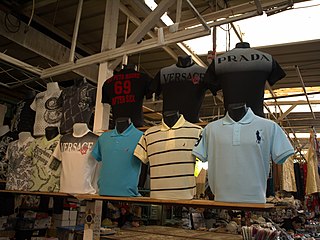
In trade, barter is a system of exchange in which participants in a transaction directly exchange goods or services for other goods or services without using a medium of exchange, such as money. Economists usually distinguish barter from gift economies in many ways; barter, for example, features immediate reciprocal exchange, not one delayed in time. Barter usually takes place on a bilateral basis, but may be multilateral. In most developed countries, barter usually exists parallel to monetary systems only to a very limited extent. Market actors use barter as a replacement for money as the method of exchange in times of monetary crisis, such as when currency becomes unstable or simply unavailable for conducting commerce.

In macroeconomics, an industry is a branch of an economy that produces a closely related set of raw materials, goods, or services. For example, one might refer to the wood industry or to the insurance industry.
Business is the practice of making one's living or making money by producing or buying and selling products. It is an activity or enterprise entered into for profit."
Commerce consists of trade and aids to trade taking place along the entire supply chain. Trade is the exchange of goods and services between buyers and sellers in return for an agreed-upon price at traditional marketplaces. It is categorized into domestic trade, including retail and wholesale as well as local, regional, inter-regional and international/foreign trade. On the other hand, auxiliary commercial activities which can facilitate trade include commercial intermediaries, banking, credit financing and related services, transportation, packaging, warehousing, communication, advertising and insurance. Their purpose is to remove hindrances related to direct personal contact, payments, savings, funding, separation of place and time, product protection and preservation, knowledge and risk.
Exchange or exchanged may refer to:
Line most often refers to:

To counterfeit means to imitate something authentic, with the intent to steal, destroy, or replace the original, for use in illegal transactions, or otherwise to deceive individuals into believing that the fake is of equal or greater value than the real product. Counterfeit products are fakes or unauthorized replicas of the real product. Counterfeit products are often produced with the intent to take advantage of the superior value of the imitated product. The word counterfeit frequently describes both the forgeries of currency and documents as well as the imitations of items such as clothing, handbags, shoes, pharmaceuticals, automobile parts, unapproved aircraft parts, watches, electronics and electronic parts, software, works of art, toys, and movies.

Distribution is the process of making a product or service available for the consumer or business user who needs it, and a distributor is a business involved in the distribution stage of the value chain. Distribution can be done directly by the producer or service provider or by using indirect channels with distributors or intermediaries. Distribution is one of the four elements of the marketing mix: the other three elements being product, pricing, and promotion.
A value chain is a progression of activities that a business or firm performs in order to deliver goods and services of value to an end customer. The concept comes from the field of business management and was first described by Michael Porter in his 1985 best-seller, Competitive Advantage: Creating and Sustaining Superior Performance.
The idea of [Porter's Value Chain] is based on the process view of organizations, the idea of seeing a manufacturing organization as a system, made up of subsystems each with inputs, transformation processes and outputs. Inputs, transformation processes, and outputs involve the acquisition and consumption of resources – money, labour, materials, equipment, buildings, land, administration and management. How value chain activities are carried out determines costs and affects profits.
One or 1 is the first natural number.
The human voice consists of sound made by a human being using the vocal tract.
International business refers to the trade of Goods and service goods, services, technology, capital and/or knowledge across national borders and at a global or transnational scale.

Television, magazines, and newspapers have all been operated by both state-owned and for-profit corporations which depend on advertising, subscription, and other sales-related revenues. Even though the Constitution of Russia guarantees freedom of speech, the press has been plagued by both government censorship and self-censorship.
The mass media in Ukraine refers to mass media outlets based in Ukraine. Television, magazines, and newspapers are all operated by both state-owned and for-profit corporations which depend on advertising, subscription, and other sales-related revenues. The Constitution of Ukraine guarantees freedom of speech. As a country in transition, Ukraine's media system is under transformation.
Vision, Visions, or The Vision may refer to:
Market is a term used to describe concepts such as:

StateUniversity of Trade and Economics is a Ukrainian university in the capital, Kyiv.
This page is based on this
Wikipedia article Text is available under the
CC BY-SA 4.0 license; additional terms may apply.
Images, videos and audio are available under their respective licenses.





